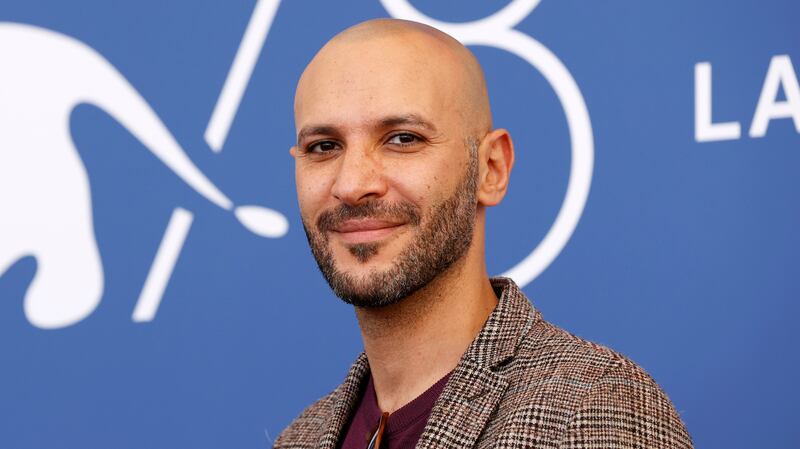“The Middle East is a gold mine for drama,” says Mohamed Diab from the Venice Film Festival, where his new film Amira has just played in the Horizons strand.
The Egyptian filmmaker behind Cairo 678 and Clash is in Italy, a short hop from Budapest, where he is currently filming Moon Knight, Marvel’s new television show.
But while the filmmaker, 43, and his producer-wife Sarah Goher have spent the past three years in America pitching to Hollywood studios, he is just as attached to telling stories from the Mena region.
“I love being in the chocolate factory in Marvel and playing with all the toys,” he tells The National. “But I love Amira. Amira’s process was unbelievable. There were things I cannot dare to do on a Marvel show. Even not having close-ups or mediums … you take bigger risks.”
The Arabic-language Amira is certainly a risk, telling a story of parentage and rebellion that was inspired by a news story about Palestinian prisoners in Israel who smuggle their sperm out of jail. As the film explains, more than 100 children have been conceived in this manner.

“The moment I read about it, I thought ‘Is this a science fiction film?’. It’s so weird and yet so human. It’s a symbol of survival. To Palestinians, this is an untouched topic.”
So much so, the real smuggling method is unknown. “They keep it secret. No one knows. There are rumours about how they do it, but they don’t tell anyone. One of the rumours is they put it in candy bars and then slip it under the glass [partition, between prisoners and visitors].”
Diab and his co-writers, his siblings Khaled and Sherin, came up with a credible alternative: a sealed plastic packet stored in a coffee cup full of ice.
Diab’s stories are often ripped from the headlines. For Cairo 678, he read about the first woman to file a sexual harassment case in Egypt. “I went to the trial myself and then I started to write the movie.”
He spent two years “immersing myself with women … trying my best to listen”. It was the same for Amira, with Diab doing his due diligence by talking to Palestinians wherever he could.
“It’s such an educational thing. It changed me as a human being.”

In truth, the smuggled sperm is only the springboard into a gripping melodrama, as the incarcerated Nuwar (Ali Suliman) and his wife Warda (Saba Mubarak) decide to have a second child. Their first, Amira (Tara Abboud), 17, was conceived via artificial insemination, too, with the same covert methods they are now planning to use again.
But then the doctors discover that Nuwar is sterile, and always has been. So who is Amira’s father? It sets the wilful teenager on a mission to discover her origins.
Apart from his cinematographer and his editor, Diab’s crew was all Palestinian, something he felt was crucial to help craft a believable narrative.
“I went with complete humility, knowing that I shouldn't explore a different country and a different culture, and one of the most sensitive situations in our lifetime, without guidance.”
Despite striving for authenticity, Diab had to shoot in neighbouring Jordan, owing to the complications of filming in Palestine.
“Jordan, for the past 10 years, they joined Morocco in being very open and very attractive to filmmakers around the world. They have great crews who work on international projects all the time. So they’re very professional. And the Royal Film Commission – any problem, they solve it. The government itself is very supportive of filmmaking.”

In terms of his own career, Diab’s support has also come from Hollywood’s finest. Take the claustrophobic Clash, which opened Cannes’s Un Certain Regard in 2016, telling the intense story of protesters locked in a police van during demonstrations at the tail-end of Egyptian president Mohamed Morsi’s reign in 2013.
A-list star Tom Hanks got vocal on Twitter in support of the film, telling his followers “you simply must” see it. When Ethan Hawke, with whom Diab is working on Moon Knight, saw the film, he also went crazy for it. “He told me: ‘This is America … we should remake the film here.',” says Diab.
After studying in America, Diab is now embedding himself in Hollywood. He has a sci-fi project at Thunder Road Pictures “about a future with less resources”. Over at Blumhouse Productions, the hugely successful company behind Paranormal Activity, The Purge and the Oscar-winning Get Out, he has another fantasy story in development.
“Imagine a superhero in the Midwest who is a Syrian immigrant,” he says. “It’s a very entertaining political film. I remember Jason Blum told me: ‘This will be the next Get Out’, which is the best thing in the world to be said.”
During the pandemic, he was invited to pitch directing four episodes of Marvel’s Moon Knight. He and his wife read the first episode and conjured up a 200-page document, which got them in front of Marvel head honcho Kevin Feige.
“The moment we finished that pitch, I told Sarah, ‘If we didn’t get the job for this, something is wrong in the world. This is too good!’” Fortunately, they were successful, and now Diab is directing Star Wars actor Oscar Isaac, who plays Marc Spector, a former US marine and CIA agent, who is granted special powers by the Egyptian moon god Khonshu.
Alongside Hawke and Isaac is Egyptian actress May Calamawy, who was born in Bahrain. “The three of them are shining. They are doing an unbelievable job,” says Diab, who can barely contain his excitement.
“To have those serious actors for a project like this, a Marvel show, it means it’s special. And we’re doing something really special. It’s a different experience … making [a story with] an American character, learning about the culture, understanding more and making something funny with action. It’s teaching me about myself. Teaching me I can do something different.”





